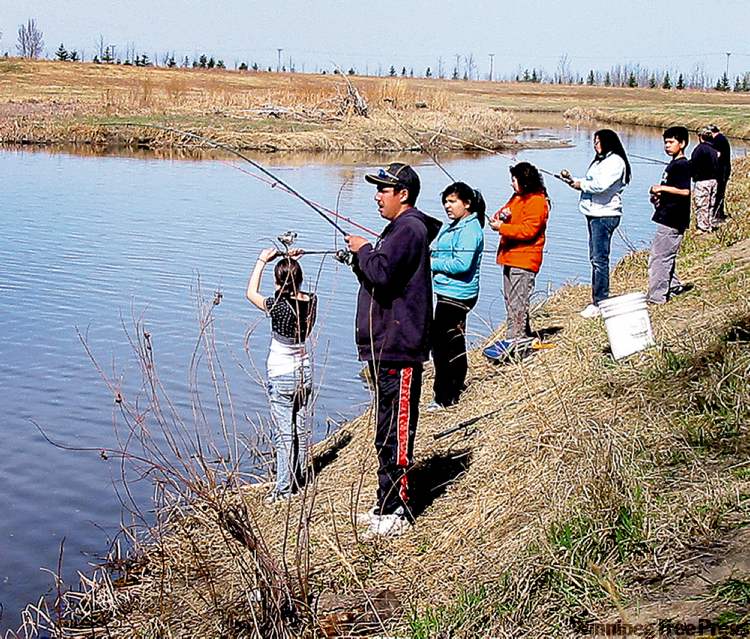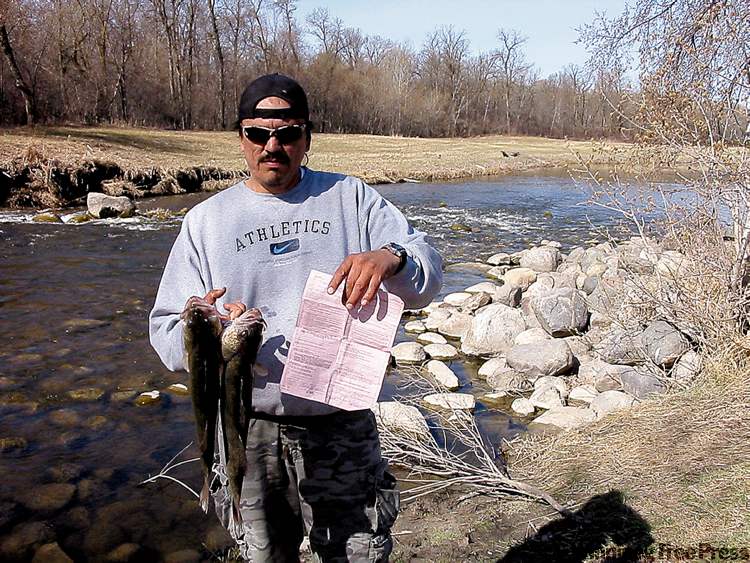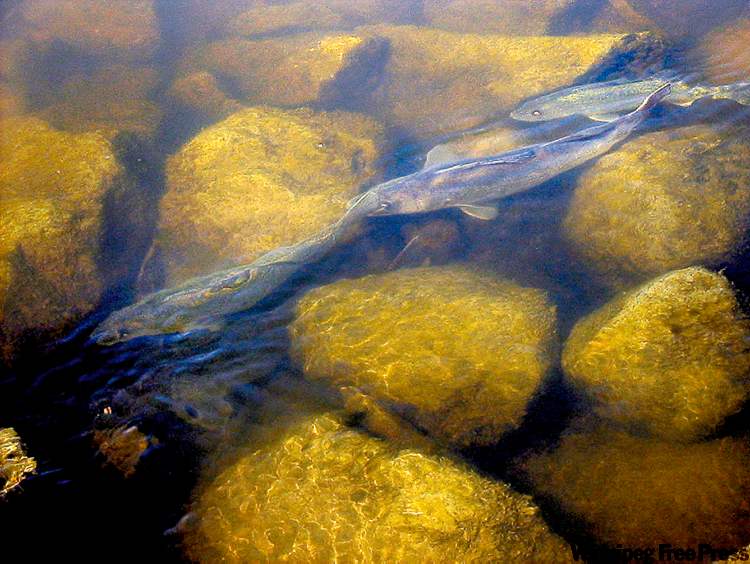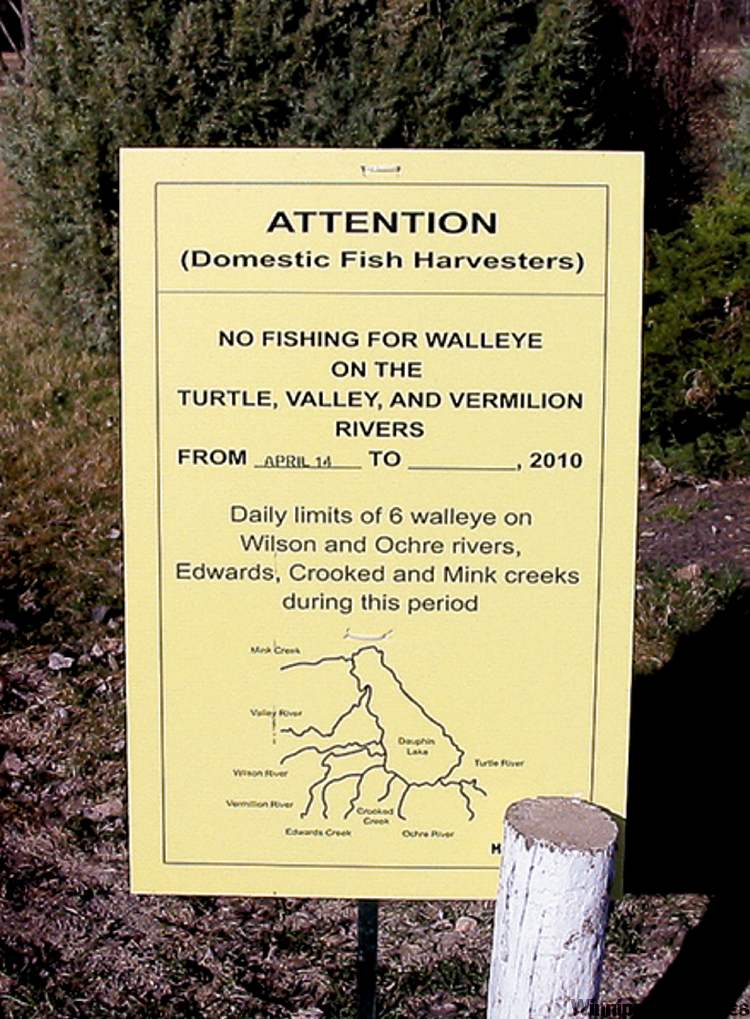Aboriginals snub province’s fishing ban
Maintain it's part of their treaty rights
Advertisement
Read this article for free:
or
Already have an account? Log in here »
To continue reading, please subscribe:
Monthly Digital Subscription
$1 per week for 24 weeks*
- Enjoy unlimited reading on winnipegfreepress.com
- Read the E-Edition, our digital replica newspaper
- Access News Break, our award-winning app
- Play interactive puzzles
*Billed as $4.00 plus GST every four weeks. After 24 weeks, price increases to the regular rate of $19.00 plus GST every four weeks. Offer available to new and qualified returning subscribers only. Cancel any time.
Monthly Digital Subscription
$4.75/week*
- Enjoy unlimited reading on winnipegfreepress.com
- Read the E-Edition, our digital replica newspaper
- Access News Break, our award-winning app
- Play interactive puzzles
*Billed as $19 plus GST every four weeks. Cancel any time.
To continue reading, please subscribe:
Add Free Press access to your Brandon Sun subscription for only an additional
$1 for the first 4 weeks*
*Your next subscription payment will increase by $1.00 and you will be charged $16.99 plus GST for four weeks. After four weeks, your payment will increase to $23.99 plus GST every four weeks.
Read unlimited articles for free today:
or
Already have an account? Log in here »
Hey there, time traveller!
This article was published 22/04/2010 (5655 days ago), so information in it may no longer be current.
STE. ROSE DU LAC — The fishing is amazing — and illegal.
But that didn’t stop scores of aboriginals Wednesday from exercising what they say is their treaty right to fish.
Aboriginal anglers defied the province’s ban on catching spawning pickerel on rivers that empty into Dauphin Lake, hauling in pails, buckets and tubs full of pickerel. Manitoba Conservation officials did not show up to enforce the fishing ban, at least not between 9 a.m. and 1 p.m.

Two youths from Skownan First Nation pulled in eight pickerel, all 0.9 to 1.3 kilograms each, in their first 15 minutes of casting on the Turtle River, which winds around Ste. Rose du Lac, about 265 kilometres northwest of Winnipeg, before emptying into Dauphin Lake.
Morris Swan Shannacappo, Grand Chief of Southern Manitoba Chiefs, was spotted pulling in a plump one. "My first cast," he shouted.
"What kind of medicine are you using?" someone shouted back.
Down the row of anglers casting from shore, it seemed someone was always pulling out a pickerel, also called walleye, during the morning fish.
You could see why. Upstream of a man-made riffle — a kind of rapids built to help fish spawn — at least 45 pickerel were visible at any one time in the clear, shallow water. The peaceful protest was held behind the religious grotto at Dollard Park in Ste. Rose.
A little farther away at the Ste. Rose bridge, also over the Turtle River, hundreds upon hundreds of pickerel could be seen spawning.

People lined up along the bridge to witness the amazing sight.
The pickerel seemed to cluster into an arrow, males following females who dropped their eggs for the males to fertilize. Only one aboriginal man was fishing at that location, using a snare — a circle of wire attached to a long stick the fish swim into — with great success.
Manitoba Conservation has banned all fishing on the Turtle, Valley and Vermillion rivers here since April 14, until the completion of spawning. In its place, and to accommodate the aboriginal treaty right to fish for sustenance, Manitoba Conservation has been handing out six frozen pickerel to every aboriginal person who shows up at the rivers.
The province ran the program last year for the first time, handing out nearly 5,000 kilograms of pickerel at a cost of $50,000, and it kept most aboriginal people from fishing those rivers during the week to two-week spawning season.
However, the truck with the freezer of fish purchased from the Manitoba Freshwater Fish Marketing Board was not at the site Wednesday, at least not between 9 a.m. and 1 p.m.
"It’s like the welfare system once again," said Thomas Nepinak, West Region Tribal Council resources adviser, and one of the key organizers of Wednesday’s event.

More than 100 aboriginal people showed up for the protest, but only 30 to 40 people fished. Nepinak said the turnout shows people are concerned about the erosion of their treaty rights. First Nation people have already made concessions to help fish populations by putting away their nets, he said.
Many aboriginal people fish at this time of year because they cannot compete during regular fishing season, he maintained. "The aboriginal is poor. He cannot afford a boat and motor. This is our time of the year when we can fish. Eighty-five per cent of us are unemployed," Nepinak said.
Gilbert Sinclair of Ebb and Flow First Nation was charged by Manitoba Conservation earlier in the week for fishing during the ban.
That didn’t stop him from fishing Wednesday. He held up his citation in one hand and two fish he’d caught Wednesday morning in the other.
The ban is "B.S.," he said. "I’m exercising my treaty rights." Sinclair said he has caught "about 30" pickerel since spawning started about a week ago.
First Nations are still fighting tickets issued to two other aboriginal fishermen last year. The cases are expected to come up in court in the next few weeks.

Joe O’Connor, director of the provincial fisheries branch, said the ban was implemented because studies show the stock of upcoming fingerling fish is drastically depleted. Sport anglers have also had their limit reduced from six fish per day, down to four.
bill.redekop@freepress.mb.ca


